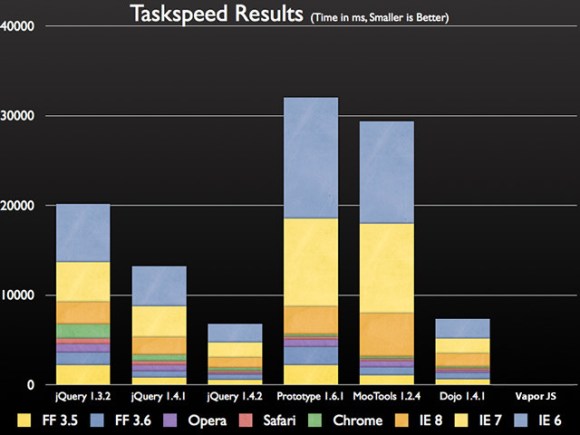September 20, 2011
I recently caught wind of an exciting new project that claims to be "the world's smallest and fastest JavaScript library": Vapor.js.
We developers are always excited about small & fast libraries, so naturally I was intrigued. Taking a look at the project's homepage, you immediately see the following tantalizing graph:

Wow. Now that's fast (off the charts, literally!)... but wait a minute. How can this be? Let's take a look at the source code...
On its GitHub page, the Vapor.js README file starts off as follows:
vapor.js is a new amazing JavaScript framework.
In just 0 lines of code it provides:
[The README ends there.]
Ah. I get it now. It's a joke.
But you know what? I actually think there's something to this. A couple of things, actually1.
First, there's the "fastest" claim and that absurd graph. Obviously, if the library does nothing, it's as "fast" as it can possibly get. But, you know, I say "obviously"; yet it's very easy to forget this fundamental axiom:
You make software faster by making it do less.
(This concept is clearly not original to me. I'm sure I've read an article or blog post specifically about this idea somewhere else; unfortunately, I was not able to find a reference with a quick Google search.)
CPUs aren't creatures; you can't magically make them perform more operations per second by cracking a whip or digging in your spurs (although like many animals, they can be sped up by reducing their load). Your processor is a machine, executing instructions at a (basically) constant rate. It's the number of instructions that affects how "fast" or "slow" your software feels.
Note that I am not just talking about features. The same feature can be implemented in countless ways, some requiring far more processing than others. For a trivial example, consider sorting a sequence. There's Bubble Sort, one of the most famously (or infamously) inefficient algorithms known to computer science; and then there are vastly superior algorithms like Merge Sort, Quicksort—one of the most efficient algorithms (for sorting) known—or even Comb Sort, which is basically Bubble Sort after getting its act together. Same feature, different implementations.
But the other point this brought to my mind is not performance-related. It has to do with quality and productivity. Far too often, software projects become burdened with external dependencies: frameworks, libraries, tools, all piled on atop one other so liberally that it can quickly become very difficult to keep track of all of them.
For a taste of what I'm talking about, here is a collage of the dependencies (that I can think of) we have on my current project:

(There's not really any good reason HAML goes in the center. Picasa chose to put it there.)
Of course, anyone who's worked on a software project of any size before will not be particularly surprised by this. That's not even that many dependencies compared to some software projects.
But guys. They're dependencies. That means if something goes wrong with any one of those tools/technologies depicted above, it's a show-stopper for us (as in: we must address that issue before we can continue working on our software).
I think I've actually made a similar point before. And, as I said then, I want to stress that I'm not saying we should abandon these (very useful) tools. I think what I've come to realize in my limited time as a software developer is simply that when you start reaching for external tools to do your job, you should take a moment to consider that a tool becomes a dependency very quickly; and the option to just not use it should always be considered, if not chosen.
-
I'm not saying the "makers" of Vapor.js actually mean it to be anything other than a joke, mind you. ↩
